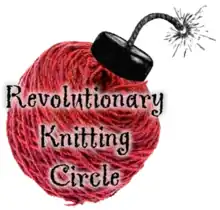 | |
| Formation | 2000 |
|---|---|
| Founder | Grant Neufeld |
| Type | Activist organisation |
The Revolutionary Knitting Circle (RKC) is an international activist group that employs craftivism, focusing on knitting and textile handicrafts, to foster social change. Established in Calgary, Canada, by Grant Neufeld in 2000, the movement has since expanded, with groups forming in various regions of the United States and Europe[1]
Mission statement
The Revolutionary Knitting Circle outlines its mission as follows:
- Community Independence: The organization advocates for reducing reliance on corporate systems. While not opposing local or international trade, the group emphasizes the importance of community-level subsistence and self-reliance. This approach aims to empower communities to make autonomous decisions regarding trade agreements.[2]
- Social Unity: The group actively challenges societal divisions such as age, gender, race, and class. It encourages diverse participation and aims to break down stereotypes, notably within its own ranks. Recognizing the traditional association of knitting with older women of certain socio-economic backgrounds, the RKC includes representatives from varied demographics to challenge these perceptions.
- Innovative Activism: RKC seeks to diversify activism strategies, offering an alternative to more conventional methods in social justice movements. Through knitting and craft-based activities, the group aims to make activism more accessible and engaging to a broader audience.
History
The Revolutionary Knitting Circle gained prominence with its first major event, the Global Knit-In, during the 2002 G8 Summit in Calgary. This event featured peaceful knitting demonstrations at significant corporate and financial institutions in various cities..[3]: 22–23 A notable instance was in Ottawa, Canada, where participants created a symbolic 'social safety net' from knitted squares.[4]
Cultural Context
The RKC's activities align with a broader history of craft-based activism, connecting to traditions such as sewing circles and the historical French 'tricoteuses.'
See also
References
- ↑ Neufield, Grant (4 February 2018). "The Revolutionary Knitting Circle Proclamation of Constructive Revolution". Medium. Retrieved 20 September 2023.
- ↑ Adamson, Glenn (2010). The Craft Reader. Berg Publishers. p. 611. ISBN 978-1-84788-303-2.
- ↑ McGovern, Alyce (2019), "Unravelling the Threads: Contemporary Craftivism and Its Origins", Craftivism and Yarn Bombing, London: Palgrave Macmillan UK, pp. 11–57, doi:10.1057/978-1-137-57991-1, ISBN 978-1-137-57990-4, retrieved 2023-09-30
- ↑ Orme, William (27 June 2002). "Needling World Leaders". The LA Times. Retrieved 4 January 2023.
